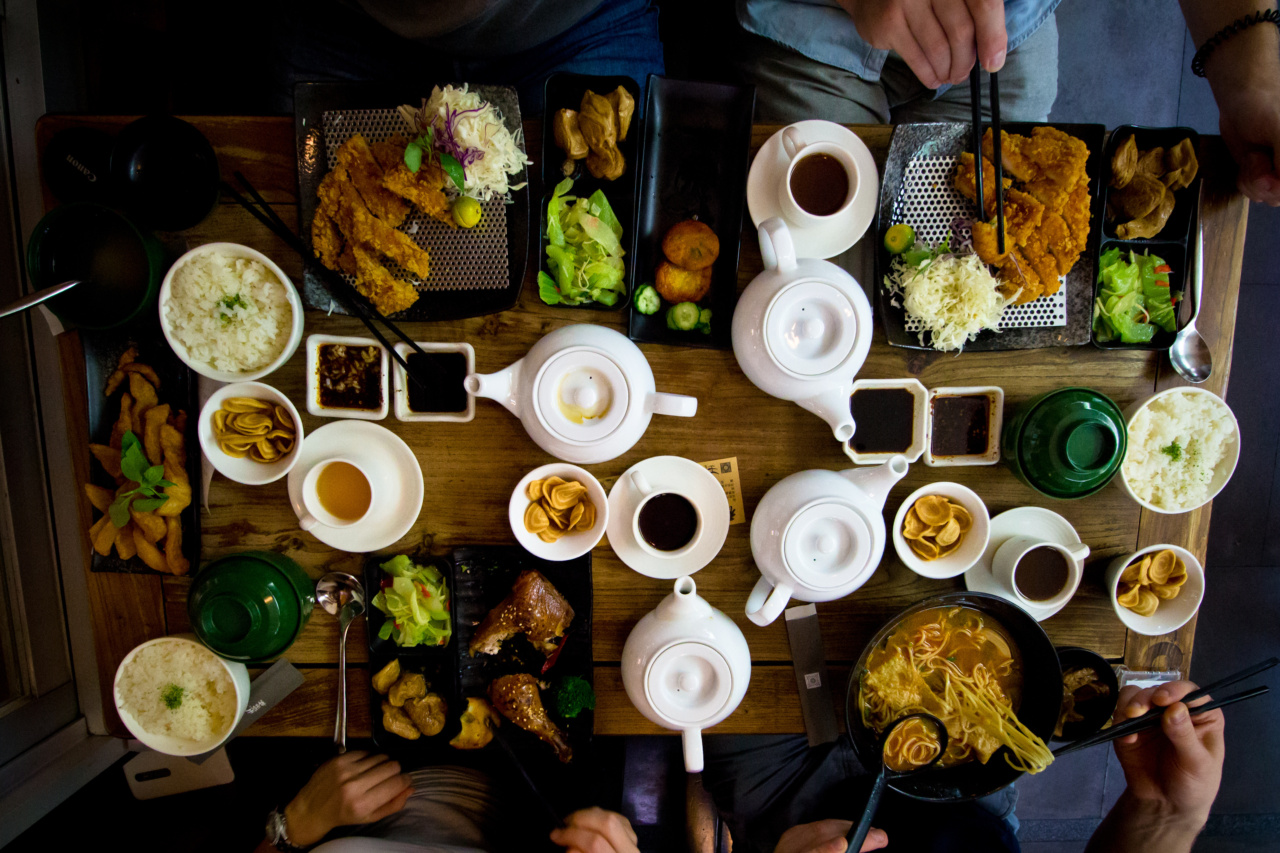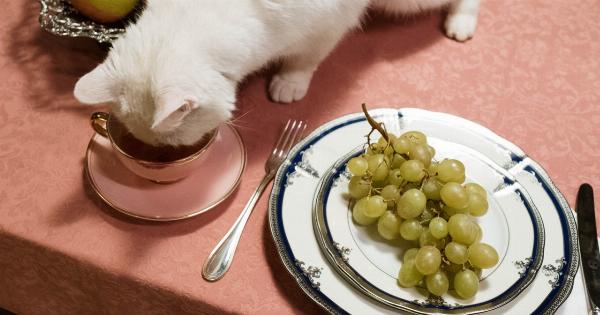When it comes to maintaining a healthy diet, understanding the science behind food combining is crucial.
The concept of food combining suggests that certain types of foods, when consumed together, can interfere with digestion and hinder nutrient absorption. One particular combination that has gained significant attention is the pairing of tea with various foods.
Tea, a popular beverage enjoyed by millions worldwide, contains numerous health benefits. From its antioxidant properties to its potential to promote heart health, tea offers a range of advantages.
Nevertheless, when consumed with certain foods, the interaction between compounds found in both tea and the accompanying food can lead to digestive discomfort or nutrient conflicts.
The Importance of Food Combining
Food combining is simply a way of eating that focuses on selecting and pairing foods in a manner that optimizes digestion.
The theory behind food combining comes from the idea that different foods require different enzymes and stomach acid levels for digestion. Therefore, when foods that require different digestion processes are eaten together, the body becomes overwhelmed and digestion is compromised.
The benefits of proper food combining include improved digestion, increased nutrient absorption, enhanced energy levels, and minimized digestive discomfort. Understanding which foods to combine and which to avoid is key to reaping these advantages.
Tea and Its Effects on Digestion
The consumption of tea has been praised for its ability to aid digestion and soothe an upset stomach. However, when paired with certain types of foods, these effects can be nullified or even reversed.
Tea contains tannins, which are naturally occurring compounds found in various plants. These compounds are known to bind to proteins, carbohydrates, and minerals, making them harder to digest.
When consumed in conjunction with certain foods, tannins can interfere with the absorption of nutrients, leading to potential deficiencies.
Additionally, tea contains caffeine, a stimulant that can affect digestion.
While moderate amounts of caffeine can boost metabolism and increase alertness, excessive consumption can lead to gastrointestinal disturbances, such as indigestion and acid reflux.
The 30 Foods to Avoid When Consuming Tea
To ensure optimal digestion and nutrient absorption, here are 30 foods to stay away from when consuming tea:.
1. Milk and Dairy Products
Milk and tea is a common combination, especially in Western cultures. However, the proteins in milk can bind with the tannins in tea, making them less available for digestion. This can lead to digestive discomfort and a decreased absorption of nutrients.
2. Citrus Fruits and Juices
The high acidity of citrus fruits and juices can cause the tannins in tea to become insoluble, leading to the formation of clumps. These clumps can be difficult to digest and may cause digestive upset.
3. High-Starch Foods
Foods high in starch, such as bread, pasta, and potatoes, can be challenging to digest when consumed with tea. The combination can lead to bloating and digestive discomfort.
4. Spicy Foods
Spicy foods can increase the production of stomach acid, which, when combined with the caffeine in tea, can lead to acid reflux and heartburn.
5. Fried Foods
Fried foods are high in fat and can be difficult to digest. When paired with tea, which stimulates the production of bile, the combination can lead to gastrointestinal issues.
6. Red Meat
The high protein content of red meat can bind with the tannins in tea, making them less available for digestion. This can lead to digestive discomfort and a decreased absorption of nutrients.
7. Legumes
Legumes, such as beans and lentils, contain complex sugars that can ferment in the intestines. When combined with tea, this can lead to gas, bloating, and indigestion.
8. Processed Foods
Processed foods are often high in additives, preservatives, and artificial ingredients, which can interfere with digestion. When paired with tea, the combination can exacerbate digestive issues.
9. Raw Vegetables
Raw vegetables can be difficult to digest, especially when consumed with tea. The combination can lead to bloating, gas, and discomfort.
10. Cruciferous Vegetables
Cruciferous vegetables, such as broccoli, cauliflower, and Brussels sprouts, contain compounds that can cause gas and bloating. When combined with tea, these effects can be intensified.
11. Nut Butter
Nut butter, such as peanut butter or almond butter, is high in fat and can be difficult to digest. When paired with tea, the combination can lead to digestive discomfort.
12. High-Fat Desserts
High-fat desserts, such as cakes and pastries, can be challenging to digest. When combined with tea, which stimulates the production of bile, the combination can lead to gastrointestinal issues.
13. Carbonated Beverages
Carbonated beverages can increase stomach distension and can exacerbate the effects of caffeine in tea, leading to bloating and discomfort.
14. Sweetened Beverages
Sweetened beverages, including sugary teas, can lead to an imbalance in blood sugar levels and can interfere with digestion when consumed with tea.
15. High-Sugar Foods
Foods high in sugar can disrupt digestion and cause spikes in blood sugar levels. When paired with tea, these effects can be intensified.
16. Artificial Sweeteners
Artificial sweeteners can disrupt the balance of gut bacteria and interfere with digestion. When combined with tea, these effects can be further exacerbated.
17. Cold Foods
Cold foods, such as ice cream or chilled salads, can hamper the digestive process. When combined with tea, they can lead to stomach cramps and discomfort.
18. Fermented Foods
Fermented foods, such as sauerkraut and kimchi, can cause an imbalance in gut bacteria, leading to digestive issues when consumed with tea.
19. White Bread
White bread is made from refined grains and lacks fiber, which can slow down digestion. When paired with tea, the combination can lead to constipation and bloating.
20. High-Gluten Foods
High-gluten foods, such as wheat-based products, can be difficult to digest for those with gluten sensitivities. When combined with tea, these effects can be amplified.
21. High-Oxalate Foods
Foods high in oxalates, such as spinach, rhubarb, and beetroot, can bind with minerals in tea and interfere with nutrient absorption.
22. High-Protein Foods
Foods high in protein, such as seafood and poultry, can be difficult to digest. When paired with tea, this combination can lead to digestive discomfort and bloating.
23. Alcohol
Alcohol can irritate the digestive tract and can exacerbate the effects of caffeine in tea, leading to gastrointestinal issues.
24. High-Sodium Foods
Foods high in sodium can lead to water retention and can interfere with digestion. When consumed with tea, these effects can be intensified.
25. High-Purine Foods
Foods high in purines, such as organ meats and certain seafood, can lead to increased uric acid levels and can exacerbate the effects of caffeine in tea.
26. High-Acid Foods
Foods high in acidity, such as tomatoes and vinegar, can exacerbate the effects of caffeine in tea and can cause acid reflux.
27. High-Fiber Foods
High-fiber foods, such as whole grains and nuts, can be challenging to digest when consumed with tea. This combination can lead to bloating and discomfort.
28. High-Lactose Foods
Foods high in lactose, such as certain types of cheese or yogurt, can be difficult to digest for those with lactose intolerance. When paired with tea, the combination can lead to digestive discomfort.
29. High-Cholesterol Foods
Foods high in cholesterol, such as fatty meats and full-fat dairy products, can be challenging to digest. When combined with tea, this combination can lead to gastrointestinal issues.
30. Highly Processed Oils
Highly processed oils, such as vegetable and seed oils, can be difficult to digest and can interfere with nutrient absorption when consumed with tea.
Conclusion
Understanding the science behind tea and food combining is crucial for maintaining optimal digestion and nutrient absorption.
By avoiding certain food combinations, such as tea with the aforementioned foods, one can minimize digestive discomfort and ensure proper nutrient utilization. Ultimately, finding the right balance between tea consumption and compatible food choices is key to achieving overall well-being.





























